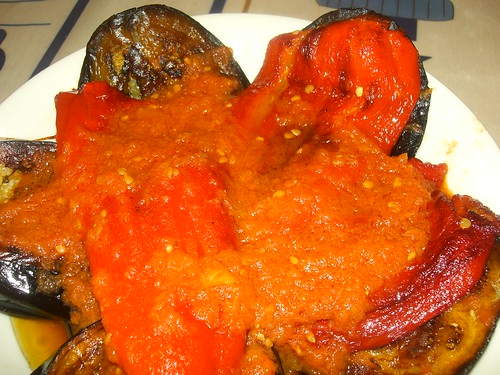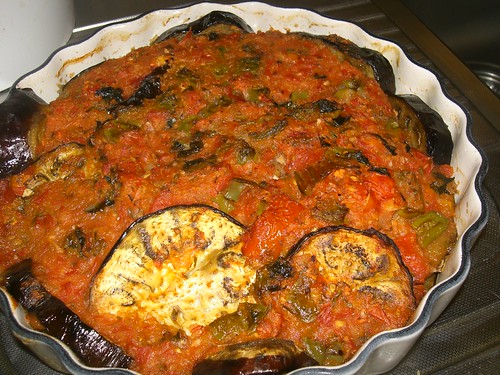Once upon a time, in the days when the main form of transportation in Hania was donkeys, a rich landowner who lived in a village came to town, his beast of burden laden with fresh produce from the crops raised on his fertile fields: fresh eggs, courgettes, tomatoes and eggplant. After selling the produce, he made his way back to the town, tying up his donkey at the stables provided for this purpose (τα χάνια - ta ΗA-nia, with the stress on the first syllable, unlike the name of the town, ha-NIA, which is stressed on the second syllable).
As he was tired, and his pockets were full of drachmas, he decided to treat himself to a midday meal at one of the finer eateries in the town. He had never eaten at a restaurant, and thought it was only fitting that he did so, as he felt rich and powerful now that today's business transactions had gone so well. He entered the restaurant, somewhere in the town centre, and sat at a table. A well-groomed waiter approached him with a menu card. The landowner was able to read, but the names of most of the food sounded completely unfamiliar to him. He was used to eating village fare, with fresh produce that he had grown or reared himself, and everything was called by its own name.
When the waiter returned to take his order, the man had still not made up his mind about what he was going to eat. He noticed that moussaka was on the menu - one of the few things he did know - but he didn't feel like ordering a food that he ate at home on a regular basis at home. Not wishing to look like an ignorant uncultured farmer, he decided to order one of the more expensive items on the menu: "Imam Baldi". The waiter took his order, and the man waited at the table, wondering what he was going to eat, as he had no idea what Imam Baldi contained.

At last, the waiter came to his table with the customary bread, wine and water. The man waited expectantly to see the dish that he had ordered. And finally it arrived: to his horror, he saw a plate of aubergines covered in peppers and tomato sauce. The man was enraged. The waiter asked him what was wrong. The man answered: "I ordered Imam Baldi, not eggplant!"
The waiter looked at the plate, and calmly explained to the man that Imam Baldi was a dish that contained aubergines. The landowner was furious: "I didn't come here to eat the eggplant I just sold at the market!" he exclaimed to the waiter. "And I'm paying double the price I sold it for!"

This story is told again and again in our town by its older residents, and has acquired legendary status, no one knowing exactly how true it is. I first heard it from an uncle of my husband's (who coincidentally lived many years of his life in the Greek community of Akron, Ohio). In any case, the moral of the story is well-known: Farmers have always had a rough time of it, since time immemorial.
The top photo is Imam Baldi a la the lovely Georgia, while the bottom photo is my rendition of it, according to an internet recipe that took my fancy, which uses our plentiful supply of garden produce. The recipe has been copied from the site, for the sake of convenience.
You need:
2 medium round eggplant
1/4 cup chopped parsley
2 red onions sliced in rounds
2 red, green or gold bell peppers sliced in rounds
1 large tomato sliced in rounds
2 cloves garlic, crushed
1 tablespoon chopped fresh mint leaves
1 can tomato sauce (I used fresh tomato)
1/2 cup extra virgin olive oil
Slice the eggplant into 1/2 inch rounds. Salt the eggplant slices and set aside for about 20-30 minutes and let them sweat. Squeeze the rounds gently to eliminate the brownish liquid, flatten back into shape, and pat dry. Dip rounds quickly into olive oil to coat, letting excess run off. Place on a baking pan and bake in a preheated 450 degree oven until lightly browned.
In a pan, carefully and lightly, saute the onions, peppers and garlic in olive oil. Add the sliced tomatoes, mint and parsley and saute for a few minutes more. Place the browned eggplant in a baking pan and arrange the sauted vegetables on the eggplant rounds and pour the pureed tomato sparingly over the top. Place in a 375 degree oven for an additional 1/2 hour. Serve warm or at room temperature.
©All Rights Reserved/Organically cooked. No part of this blog may be reproduced and/or copied by any means without prior consent from Maria Verivaki.
Im always amazed at how filling this all veggie dish is and always delish...nice photos here too, Maria.
ReplyDeleteThis looks good. I'll have to try this version. I'm a sucker for any recipe with mint.
ReplyDeleteI love this dish. Just give me a view of the sea and a warm breeze and I'm there...don't forget the good looking Greek fellow to serve it to me.
ReplyDeleteGreat anecdote.
ReplyDeleteHi from Istanbul,
ReplyDeleteFor 2-3 months, I've been visiting your place. Congratulations, it's so frankly and yr recipes are reminding me to my mom's (and grand mom's) foods.
Our roots coming fm yr lovely island (and some parts, fm yr city too). But till today, I couldn't visit Crete yet.
When I see, "Imam Baldi" recipe, I decided to write some, about it's mean.
Imam Bayildi is a Turkish food. Not so special one. But, it's name has a mean in Turkish.
The story that you wrote above, wonderful. It's typically Cretan.
Maybe you know, what "Imam" is ?
Imam : Muslim Preacher, kind of Hodja
Bayildi : Fainted
But here, Bayildi mean is LOVED (ADORED)
I guess, you got it's mean now ;
IMAM BAYILDI : The food which preacher loved.
kali nihta (not sure, is it right?),
ibrahim
hi ibrahim - what a wonderful contribution to this post, i thank you from the bottom of my heart.
ReplyDeletei am presently reading a book by saba altinsay called 'kritimu'. it is about people like your family who had cretan roots and left during after 1922.
i would love to correspond with you - my email is mverivaki at hotmail.com
Maria, your story sounded so familiar to me told by the our elders in Turkey, the only difference is the dish that is involved. It's the exact same story except the farmer orders "bakla" (fava beans) at the restaurant which he grows plenty of in his farm. The reason he selected bakla was because the name sounded so beautiful. It is interesting that we have the same stories :)
ReplyDeleteAs for the imam bayildi, in Turkish it means the Imam (muslim leader) fainted. Some say because he fainted because the meal was so delicious, others say it was because of the price of olive oil. Who knows if it's true.
we are all made of the same fabric!
ReplyDelete